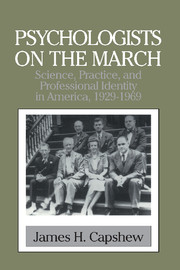Book contents
- Frontmatter
- Contents
- Acknowledgments
- List of Abbreviations
- Introduction: The Psychologists' War
- Interlude I
- 1 Growing Pains: After the Great War
- 2 Mobilizing for World War II: From National Defense to Professional Unity
- 3 Home Fires: Female Psychologists and the Politics of Gender
- Interlude II
- 4 Sorting Soldiers: Psychology as Personnel Management
- 5 Applied Human Relations: The Utility of Social Psychology
- 6 From the Margins: Making the Clinical Connection
- 7 Engineering Behavior: Applied Experimental Psychology
- Interlude III
- 8 A New Order: Postwar Support for Psychology
- 9 Remodeling the Academic Home
- Interlude IV
- 10 The Mirror of Practice: Toward a Reflexive Science
- 11 Beyond the Laboratory: Giving Psychology Away
- Interlude V
- Epilogue: Science in Search of Self
- Index
Interlude I
Published online by Cambridge University Press: 06 July 2010
- Frontmatter
- Contents
- Acknowledgments
- List of Abbreviations
- Introduction: The Psychologists' War
- Interlude I
- 1 Growing Pains: After the Great War
- 2 Mobilizing for World War II: From National Defense to Professional Unity
- 3 Home Fires: Female Psychologists and the Politics of Gender
- Interlude II
- 4 Sorting Soldiers: Psychology as Personnel Management
- 5 Applied Human Relations: The Utility of Social Psychology
- 6 From the Margins: Making the Clinical Connection
- 7 Engineering Behavior: Applied Experimental Psychology
- Interlude III
- 8 A New Order: Postwar Support for Psychology
- 9 Remodeling the Academic Home
- Interlude IV
- 10 The Mirror of Practice: Toward a Reflexive Science
- 11 Beyond the Laboratory: Giving Psychology Away
- Interlude V
- Epilogue: Science in Search of Self
- Index
Summary
Whether by choice or by chance, psychologists at Harvard University have been making headlines for more than a century. Beginning with William James, author of The Principles of Psychology (1890), America's oldest academic institution has harbored a succession of prominent and controversial figures. James, credited with starting the first psychological laboratory in the country, lost faith in the emerging discipline as it became preoccupied with the experimental method in the production of new knowledge. Before abandoning psychology for philosophy, however, he arranged for a major expansion of the Harvard laboratory, including the importation of experimental Hugo Münsterberg from Germany to direct it. Münsterberg, who was hired in 1892 as a representative of the pure research ideal, proved to have equally strong convictions about the importance of applied psychology and became a highly visible proponent of the social utility of psychological knowledge. During the First World War, Münsterberg's outspoken views on the superiority of German culture made him a lightning rod for criticism, and his loyalty was called into question. In 1916, a few months before the United States entered the war, a stroke killed him while he was delivering a public lecture.
Münsterberg's eventual successor was Edwin G. Boring, who became director of the laboratory in 1924 and set out to restore the primacy of experimental work in psychology, at Harvard and elsewhere. Like his predecessors, he became one of America's best-known psychologists.
- Type
- Chapter
- Information
- Psychologists on the MarchScience, Practice, and Professional Identity in America, 1929–1969, pp. 9 - 14Publisher: Cambridge University PressPrint publication year: 1999

